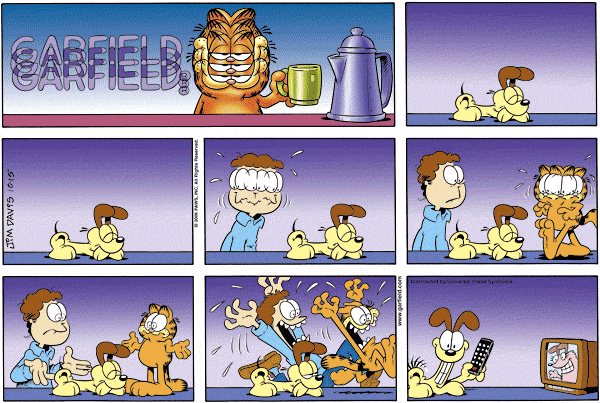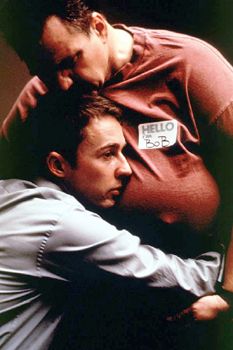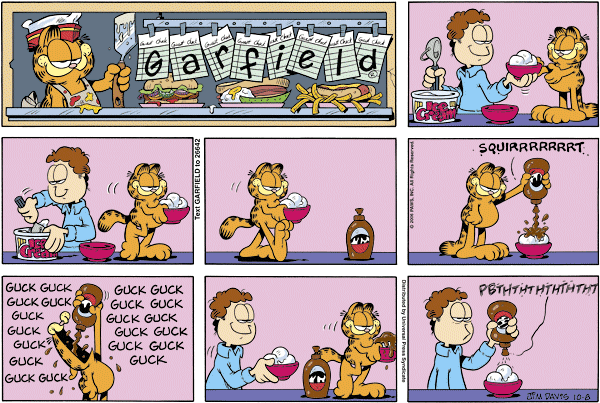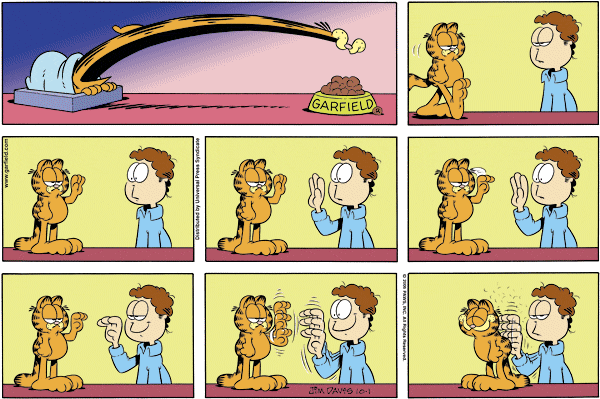 Title Panel:
Title Panel: In the spirit of radical, twisted
Garfield self-referentiality, investigate the obnoxious/ funny
Bean Me! non-game on the official website. Yours truly chugs enough coffee every day to kill a tabby several times over, and few graphical representations of the queasy ecstasy of caffeine jitters have achieved the subjective accuracy as
Garfield.
Since You Asked: A lot of readers left comments or e-mailed, specifically asking for either explanation of the joke or... well, mostly people are just baffled by the joke. Not to boast (as I regularly
misread or
can't figure out Garfield gags), but I thought it was pretty clear, though that is bolstered by familiarity with
Garfield gag techniques. It's a patented Inexplicable Behavior Explained by Last Panel Reveal strip.
The Plot: Jon and Garfield look increasingly anxious. Eventually their frenzy peaks, and they run screaming from the room. Odie sleeps calmly through the outburst, and in the end, reveals the TV remote control, secreted under his body. It seems Jon and Garfield were driven to the brink of madness because they could not find the remote. With his newfound power to choose stations, Odie selects a program about a dog waving at the camera.
The question of when a mini-TV was put on The Table remains unanswered.
Man and His Machines: Odie dupes his intellectual superiors by striking at their cultural Achilles heel. The readership may find it fair or unfair, but television in
Garfield is always depicted as idiotic and intellectually corrupting. Today, being deprived of this commodity of idiocy causes panic and eventual degeneration into helpless, preverbal animalistic frenzy. There are any number of icons of sustenance Odie could withhold from the
Garfield cast, to cause such a meltdown. Garfield without coffee, Pooky or lasagna or Jon with a locked sock drawer might react the same way, but it is telling that the stupidest character achieves power over the others by mastery over their stupidest addiction.
So pervasive is Odie's conquest that he summons programs that do not seem to otherwise exist, and he has made Jon and Garfield forget that the main, full-size television is still available for use in the living room, and probably uses an entirely different remote control.








 Affection in Garfield is an aggressive emotion, its most frequent expressions normally portrayed as unwelcome and overbearing. In its most common manifestations, we see Jon's desperation for love from Liz, and companionship and respect from Garfield, Odie's indiscriminate attacks of physical ardor, Nermal's narcissistic longing for praise and attention. This is not to say it is a negative, or destructive impulse, just that the infrequency of characters exhibiting reciprocity to caring and understanding give affection a specific power and commodity in the world as Garfield sees it. The means by which Garfield copes with this shortage is to channel desire into aesthetic passion for food, sleep, TV, flowers, etc., which he variously decimates or overindulges and exhausts the love-object. This is less self-delusory than an act of self-deprivation; in the interest of sustaining control over his surroundings and self, Garfield eliminates from his nature those desires which cannot be reliably self-fulfilled. In effort to maintain his Cool, love takes a backseat.
Affection in Garfield is an aggressive emotion, its most frequent expressions normally portrayed as unwelcome and overbearing. In its most common manifestations, we see Jon's desperation for love from Liz, and companionship and respect from Garfield, Odie's indiscriminate attacks of physical ardor, Nermal's narcissistic longing for praise and attention. This is not to say it is a negative, or destructive impulse, just that the infrequency of characters exhibiting reciprocity to caring and understanding give affection a specific power and commodity in the world as Garfield sees it. The means by which Garfield copes with this shortage is to channel desire into aesthetic passion for food, sleep, TV, flowers, etc., which he variously decimates or overindulges and exhausts the love-object. This is less self-delusory than an act of self-deprivation; in the interest of sustaining control over his surroundings and self, Garfield eliminates from his nature those desires which cannot be reliably self-fulfilled. In effort to maintain his Cool, love takes a backseat.









